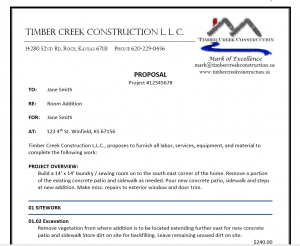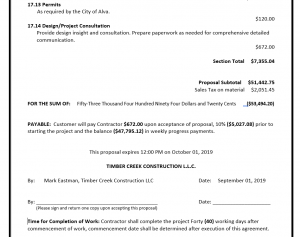The Nuts and Bolts of a Construction Agreement
The last two weeks I wrote about how to prevent your construction project from falling apart and the high cost of no communication.
In the first post I focused on –
- The fact that bad construction experiences are way too common
- The most frequent reasons that it happens
- The number one reason it does
Last week’s emphasis was on –
- The high cost of this bad communication
- Reasons communication is avoided
- The results that can be expected when it doesn’t
What can you, as the customer, do to avoid having a bad construction experience?
It’s not as difficult as it initially appears. It will require some time, effort and education. Reading this week’s solution is a good start.
Communication needs to be thorough and understandable. If it’s not, then it really isn’t communication. When considering a construction project, it is even more important because you have a lot at stake, i.e. time, money, finished project, etc.
Before you start your project, you should expect a written proposal. This proposal should include:
- Information pertaining to customer and job – Customer’s name, project address, what the job is, who the proposal is going to.
- What is going to be provided by the contractor – Labor, services, material, equipment, etc.

- Scope of work – A written-out description of what the project is going to include, specific work to be done, dimensions, materials to be used, etc.
- Price – Amount for each specific element of the project in addition to a total for the complete project.

- Payment arrangement – When the payments will be made (at specific time intervals or at completion of specific portions of the project).
- Project duration – The amount of time the project will take to do after starting.
Now you have the important pieces you need to make an informed decision about your project. You should be able to determine if you and your contractor are in agreement about what the project includes, the price to have it done and how long it will take. One piece of information that is still missing, is when will the project get started. This information will come in a contract after the proposal has been signed.
If your contractor is qualified to do your project, they should be busy doing other construction projects as well as preparing other proposals. This means they can’t realistically schedule your project until the proposal has been signed.
Then they can follow up the signed proposal with a contract. This contract should include:
- Information pertaining to customer and job – Same as on the proposal including any additional pertinent legal information needed.
- Reference to any additional documents – This could be drawings, specific information about materials used, requirements of the governing body, etc.
- Construction funding – Pertinent banking information if money is being borrowed.
- Property specifics – Location of boundaries and/or need for surveying.
- Start time – The time for the project to be started and the duration.
- Terms and conditions – More in-depth explanation of project specifications, expectations, requirements and permissions.
This amount of communication can lead to information overload, but don’t let it. If you don’t understand something, ask your contractor. If they’re unwilling or unable to satisfactorily explain it to you, this may be another indication that they aren’t the right fit for you.

This construction project is your dream don’t let it turn into a nightmare.
I’ve spent a lot of time on the communication reason construction projects fall apart. Next week we’ll look at the second half of the list.
- Poor quality
- Cluttered and unorganized job site
- Left hanging part way through an unfinished project
- Lack of scheduling or poor time management
Share your construction nightmares in the comments below.


